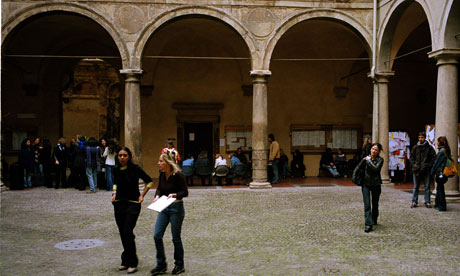Moving beyond the Bologna process: Europe as one higher-education space
A fresh perspective and a new pilot scheme is needed to unify higher education across Europe, says Maastricht University'sProfessor Martin Paul

Students at Bologna University, Italy: Professor Paul Martin wants to see Europe as a single higher education space. Photograph: Eamonn Mccabe
Not before time, the House of Lords in the UK has announced an inquiry into European Union support for universities and student mobility. By now, the vision of a single higher-education space across Europe was supposed to be a reality. But achieving that goal is taking longer than expected.
The idea was that by 2010 students and academic staff would be moving freely between European countries and institutions, secure in the knowledge that the qualifications they achieved would translate between EU member states.
Some significant progress has been made in the 12 years since all this was first envisaged in the Bologna protocol, drawn up by 29 countries across Europe, and in the five years since recognition of common European degree standards was agreed in Lisbon. More than 210,000 students now spend part of their degree abroad through the Erasmus exchange scheme alone, and the number of academics crossing national borders to teach is increasing year on year.
But no-one would argue that we are anywhere near reaching all the goals these two agreements set out. A report last month on the Erasmus scheme showed that one in five students was forced to retake courses and exams after failing to receive full credit for studies abroad, while the European Commission has just put forward new measures to support the aims of the higher education area, including profiling institutions and giving financial support to master's students studying abroad.
In my view, we need to act faster than this. Educating young people, and, more important, preparing a European workforce, is becoming an urgent priority thanks to increasing competition from the United States, China, India and emerging countries. Add to this the economic crisis facing Europe, and the need to move fast to create more promising career prospects for our students becomes clear.
We do not have time to spend painstakingly matching education qualifications and waiting for every institution in every country to reach exactly the same standards. For one thing, not every institution can, or should, be aiming to do the same things. Differentiation is important. Some universities are regionally focused, some nationally focused, and that is what they do best.
Other institutions, however, are much more advanced along the road of internationalisation. At Maastricht, our ambition has long been to be aninternational university with an international classroom.
We have attracted attention in the UK since increasing the number of UK students we recruit fivefold over the past two years. Our motivation for this is our European and international agenda. We have a European law school, a European business school and a European public health programme. Our European focus and international outlook means we want students from the UK to join the thousands that already come here from other countries in Europe and beyond.
Of course, we are not the only ones. There are other institutions like ours across Europe that have similar missions. What we now need is a kind of pilot scheme bringing all these together, a sub group of universities that have been working in an international context for some time – perhaps one or two from half a dozen European countries – to be at the vanguard of creating the European higher education area.
This group could gather evidence on what sort of education works in an international context, what professional skills students need, and what kind of careers they develop. It could produce a blueprint of what a European university should look like and what the quality of students should be.
This could be achieved very quickly because the institutions already exist. It would need European-level funding, but it would be an essential investment in Europe's future labour market.
We already run many Europe-wide competitions for research grants. Why not run a similar competition for institutions wanting to be part of this pilot scheme? Then we could also stimulate a process that would make many institutions across Europe think about adopting a more European and international focus.
We badly need to develop the tools to be competitive in producing a knowledge-based workforce for the European and global market. But we have tried for 12 years to create a European higher education area on a macro level with mixed results. This big machine approach is not working. A smaller, more focused model, would increase our chances of success.
Professor Martin Paul is president of Maastricht University.
Source:
No comments:
Post a Comment